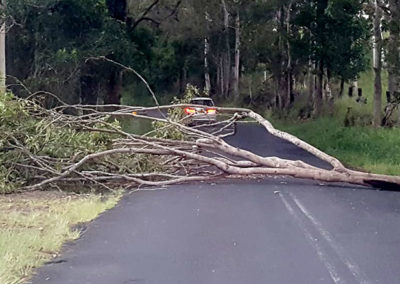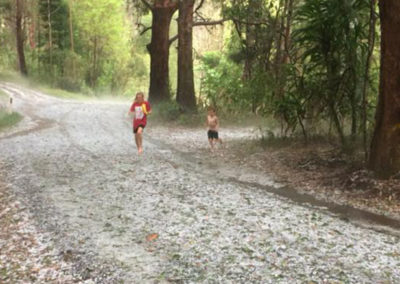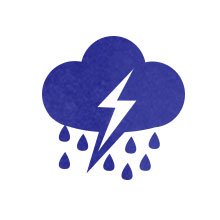 Storms
Storms
How do storm events affect our community?
The Spring/Summer storm season from September to February can see a fair number of pretty severe storms sweep through The Channon valley and the surrounding landscape. With predictions of increasing intense weather events, we may see more storm intensity in the years ahead with the effects of climate change.
As we live in a rural area, we see storms bring down limbs and trees as well as lightning strikes and power outages, hail damage and strong winds causing damage.
BEFORE
Prepare for Storm season ahead of time
Winter and early Spring (June-Sep) is the best time to prepare your home before storm season kicks around late September. Taking steps early to secure and protect your property can improve the safety of yourselves and your home. If you rent or are just visiting, you will still be safer if the property is prepared.
Home maintenance suggestions BEFORE storm season begins:
- Fit windows with shutters or metal screens for added protection during high winds.
- Arrange for a professional builder to check your building and identify measures to increase the structural security of your home to withstand high winds.
- Check the condition of the roof and arrange for the repair of loose tiles, eaves and roof screws.
- Clean gutters and downpipes so water can drain away as quickly as possible.
- Trim trees and overhanging branches. If your property has large trees, arrange for an arborist to check them.
- Identify loose items around your property and garden that could cause damage if blown around in high winds (such as garden furniture and toys).
Other general home preparations:
- Ensure your home, contents and car insurance is current and provides adequate cover
– check your policy includes debris clean up and disposal costs.
- Identify which room is the safest part of the house, in case you need to shelter at home during severe storm or cyclone (usually this is the smallest room with the least windows).
- Identify where and how to turn off mains supply for water, power and gas.
- Purchase emergency essentials to have on hand, such as:
– containers to store drinking water supplies
– spare supply of fuel for use in your vehicle (ensure you store safely)
– wide masking tape for windows
– sandbags – hessian bags filled with sand to place over indoor drains to prevent sewerage backwash from flooding.
DURING STORM EVENTS
Listen out for Alerts & Updates
Local ABC radio
Council disaster website https://disaster.lismore.nsw.gov.au
The Channon Hookups for locals posting about trees down etc
As the severe storm approaches:
- When a severe storm approaches, make sure you have your mobile phone close by, and it has a fully-charged battery.
- Disconnect electrical appliances and all external TV/radio aerials.
- Shelter and secure your pets and animals but do not tie up pets outside.
- Turn off electricity and gas main supplies if instructed by authorities.
- Place your vehicles undercover or cover them with tarpaulins or blankets.
- Secure loose items (like trampolines).
- Place outdoor furniture inside or, if you have a swimming pool, submerge plastic outdoor furniture under the water to prevent it flying around in high winds.
- Fill buckets and bath with clean water in case the water supply becomes restricted (make sure you have water purification tablets to make water drinkable).
- Close windows with shutters or tape windows without shutters in a criss-crossing pattern using strong packing tape and draw curtains.
- Move wheelie bins inside or fill with water.
- Check all household members are safe and are sheltering in the safest room in the house (internal room, hallway, built-in wardrobe or cellar).
- Take your Household Emergency Kit with you while sheltering from the storm or cyclone.
- Keep listening to alerts and updates for further warnings and safety messages.
When the storm strikes:
- When a severe storm strikes stay inside, keep away from windows and remain in the strongest part of the house, which is usually the bathroom.
- If you are outdoors, find emergency shelter and do not stand under trees.
- You should: listen to your portable radio for storm updates.
- If driving, stop and park away from trees, power lines and creeks avoid using the landline telephone during the storm.
AFTER – RECOVERY FROM STORMS
Trees across roads
Often community members are the first on the scene for fallen trees over roads after a storm has passed. Being part of a practical rural community means we often clear these ourselves, before any more official services arrive to do so. If you come across a tree that you can’t get past, post about it on The Channon Hookups Facebook Group, as someone may well be able to clear it quickly.
Report fallen powerlines or phonelines
If you see fallen power or electricity lines please alert: Essential Energy 132 080
If you need help with cleaning up trees or unsafe branches, there’s a list of local arborists in the directory.
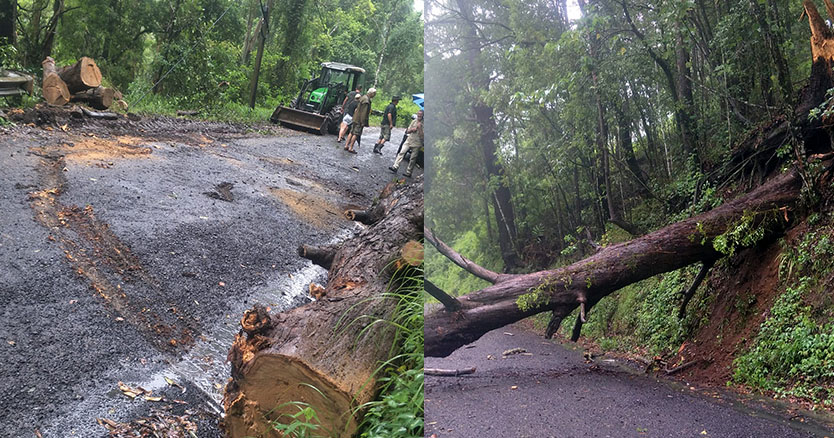
To report a Storm-related Emergency
phone Triple Zero 000
For Flood Or Storm help
Phone SES on 132 500
For Loss of power
Electricity problems or fallen
powerlines contact essential
energy on 132 080
To Register for SMS flood Alert
Call Lismore City Council on
1300 87 83 87 Or Visit
www.lismore.nsw.gov.au

Download the BOM app.
Keeping an eye on the weather is the best way to stay informed this app makes it easy.
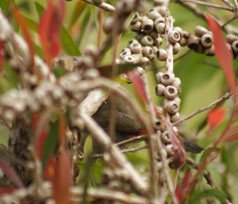
Join the Channon hookups
Facebook group to connect to our community as well as get regular updates on what is going on.

Lismore disaster dashboard
live feed of local weather warnings, road hazards, power outages, and much more!

